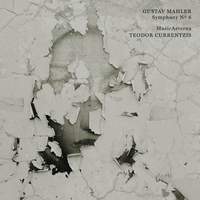Recording of the Week,
Teodor Currentzis conducts Mahler's Sixth Symphony
Teodor Currentzis and his orchestra MusicAeterna have an unfailing ability to present idiosyncratic takes on familiar repertoire, not least an emotionally turbulent account of Tchaikovsky's Sixth Symphony from October last year. Now they present us with another Sixth Symphony, this time by Gustav Mahler. Looking back at my Tchaikovsky review, I noted how exhausting a listen it was (in a good way!), and the same is true here: even after just the first movement, the emotional journey that Currentzis and his orchestra had presented was so draining that I needed a moment to gather myself before continuing.
 I think part of the reason for this is the highlighting of every last rhythmic nuance and finer point of articulation that can often pass by unnoticed. The very first bars demonstrate this point perfectly: while of course there are plenty of recordings that bring out the menace of the cellos and basses' opening salvo of repeated quavers, here Currentzis adds an extra bit of grit and a harsher, stabbing attack to the start of each note that is terrifying.
I think part of the reason for this is the highlighting of every last rhythmic nuance and finer point of articulation that can often pass by unnoticed. The very first bars demonstrate this point perfectly: while of course there are plenty of recordings that bring out the menace of the cellos and basses' opening salvo of repeated quavers, here Currentzis adds an extra bit of grit and a harsher, stabbing attack to the start of each note that is terrifying.
Similarly, the pastoral interlude that begins halfway through the first movement, with the sound of distant cowbells and gentle woodwind solos, is always a moment of calm both before and after the storms that surround it, and yet by bringing out the chain of trills and tremolo chords from violins and celesta that underpins this section, Currentzis manages to turn it into something quite unsettlingly eerie, a magical touch that shows his responsiveness to these tiny details in the score.
Of course there are also many moments of great beauty, not least the Andante movement, which Currentzis chooses to place third, after the Scherzo (opinion differs on which is the "correct" order of these middle movements, a debate which I will not get into here!). Again, I could hear tiny touches like a sustained, low contrabassoon note gently making its presence felt, or a finer point of articulation from the strings that the players take care to observe. The sublime climax of this movement is exquisitely done, with a full tone from the upper strings underpinned by a weighty foundation from cellos and basses. This fades away into a hushed final page, with an impressively-held chord from muted horns that melts away into nothing.
All of which brings us to the mighty Finale. At over half an hour in length, it's hard to pace the many ups and downs, but for me Currentzis gets the balance just right, allowing space for moments such as the woodwind chorale early on, yet also knowing when to press ahead towards a climax. As undoubtedly heavy as the brass playing often is (particularly the horns who have a pleasingly edgy bite to their sound), Currentzis is, as ever, alive to the details of Mahler's orchestration so that I could hear the way that, for instance, pizzicato violas double a horn phrase at one point, or a celesta chord marked forte makes itself assertively heard against an otherwise pianissimo backdrop.
This final movement is notorious for its great hammer blows of fate that crop up at various points (again, there is some controversy about exactly how many there should be, but here Currentzis follows what is by now the accepted view that there should be just two rather than three). While here the hammer blows themselves are perhaps not as earth-shatteringly deafening as on some other recordings, it's the aftermath of these moments that seems to interest Currentzis more. The ferocity and power of the brass after the first blow is very satisfying, whilst the swirling strings after the second give such vigour to their semiquavers that they sound like an angry swarm of bees in an especially bad mood crossed with the most distressing of panic alarms.
I hope that gives you an idea of why I was quite exhausted after listening to this! After the closing trumpet chord had faded away, more than ever I felt the need to sit in silence to contemplate what I had just heard. I suppose that's the best recommendation I can give really: just as in so many of Currentzis's previous recordings, he makes you think again about a piece you thought you knew really well, and presents it to you with a fresh approach and an invigoratingly novel angle.
MusicAeterna, Teodor Currentzis
Available Formats: CD, MP3, FLAC, Hi-Res FLAC



